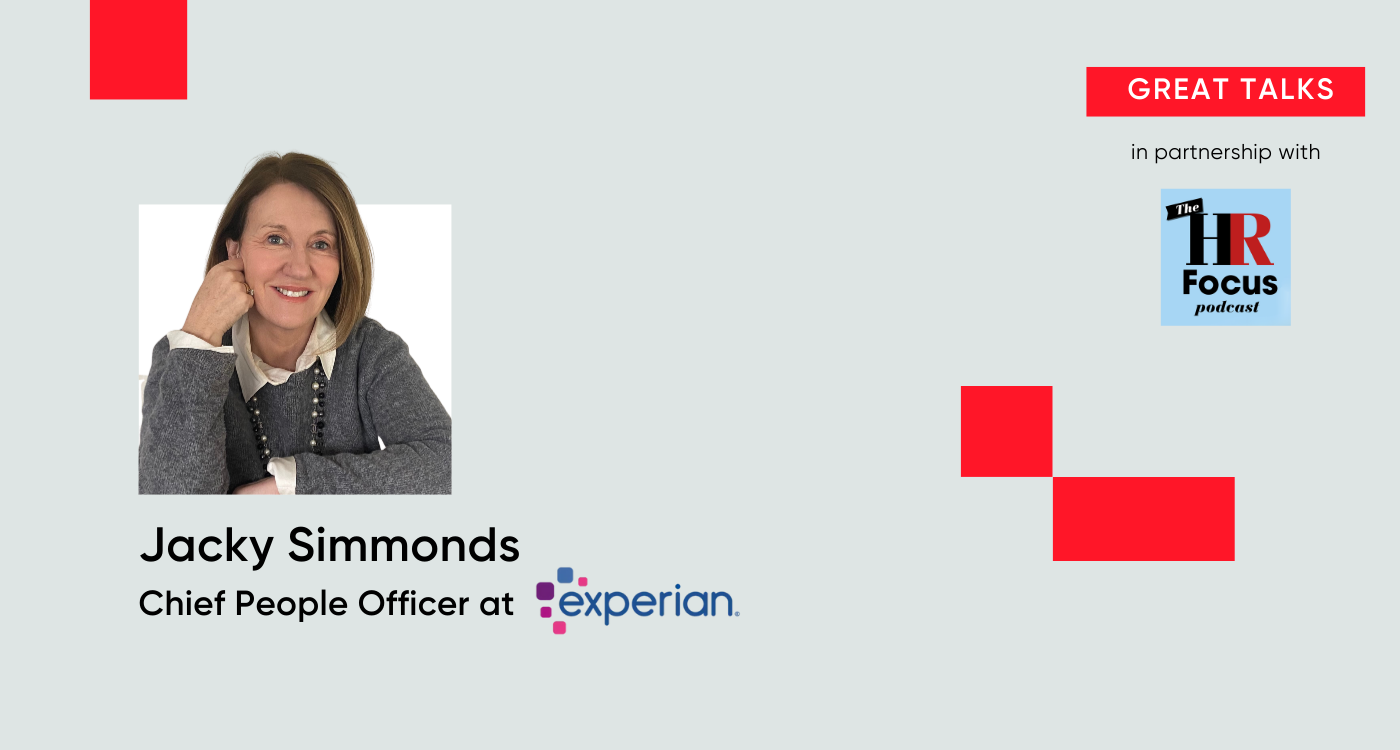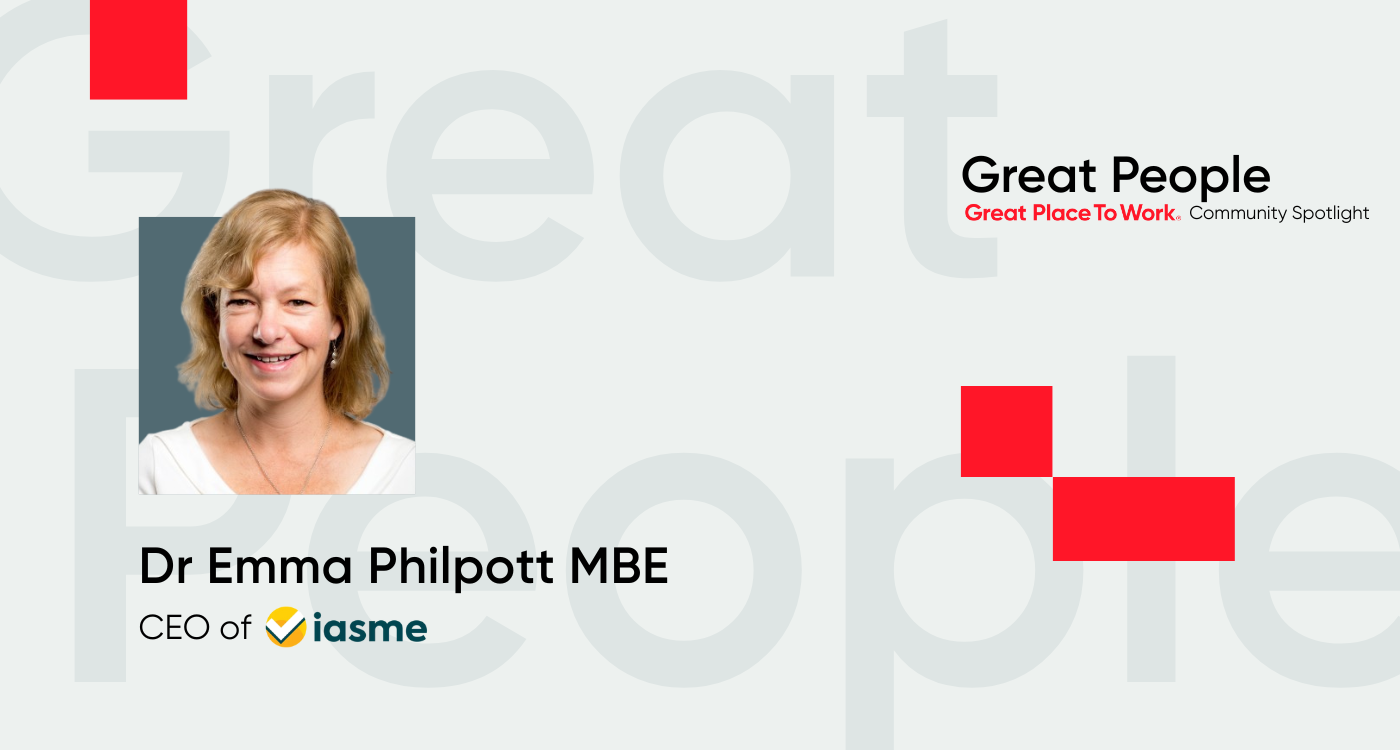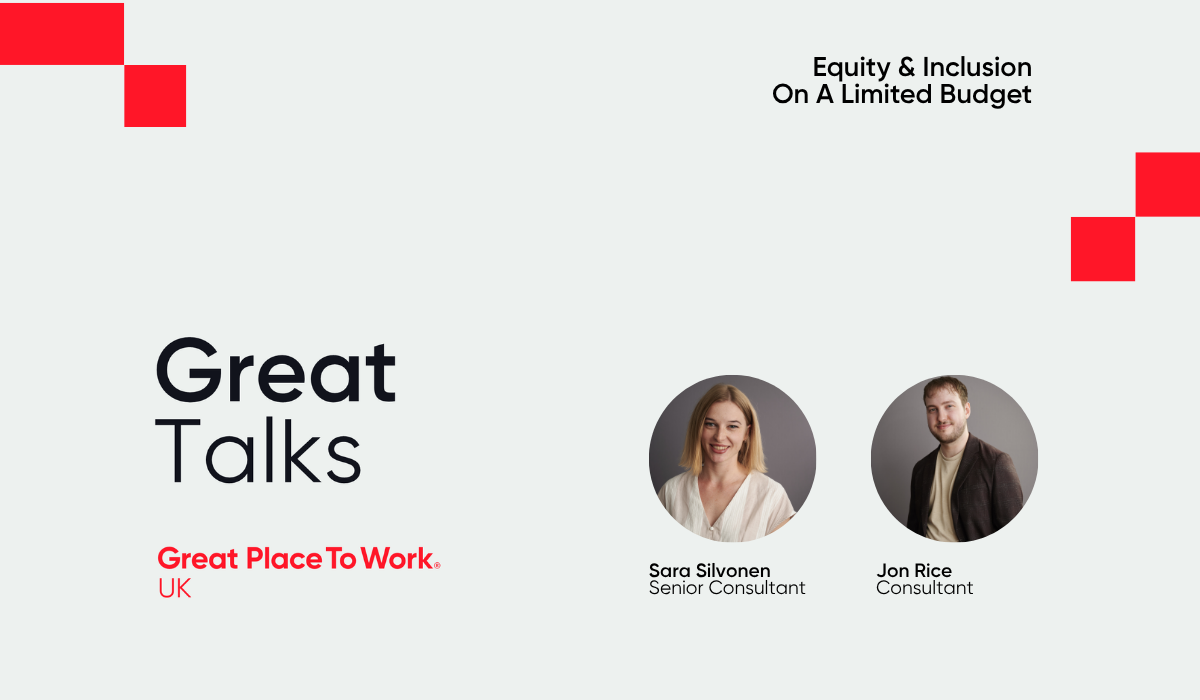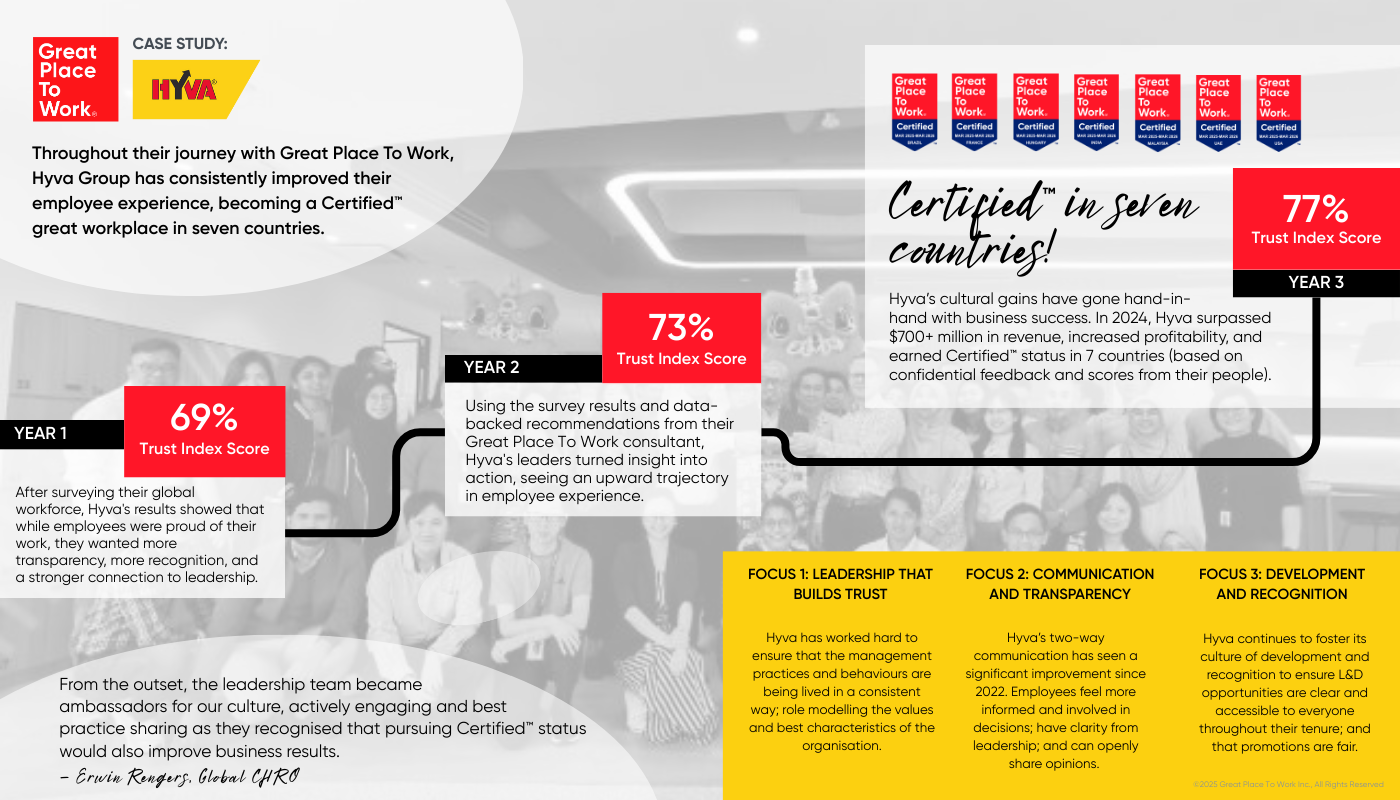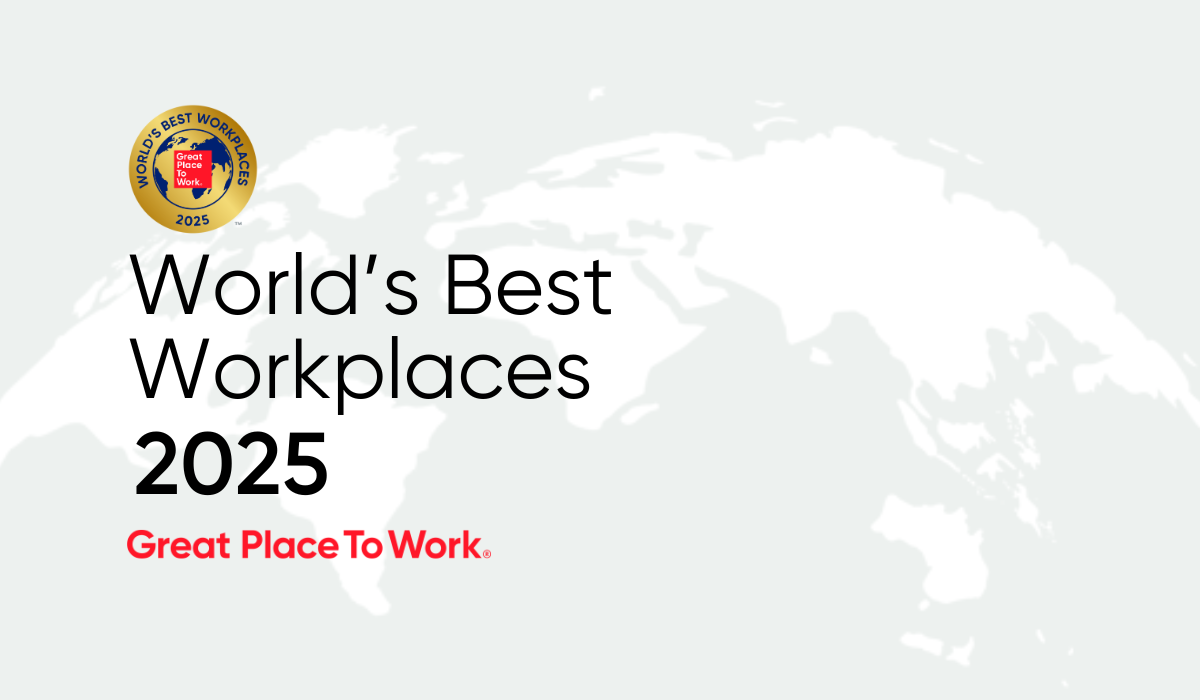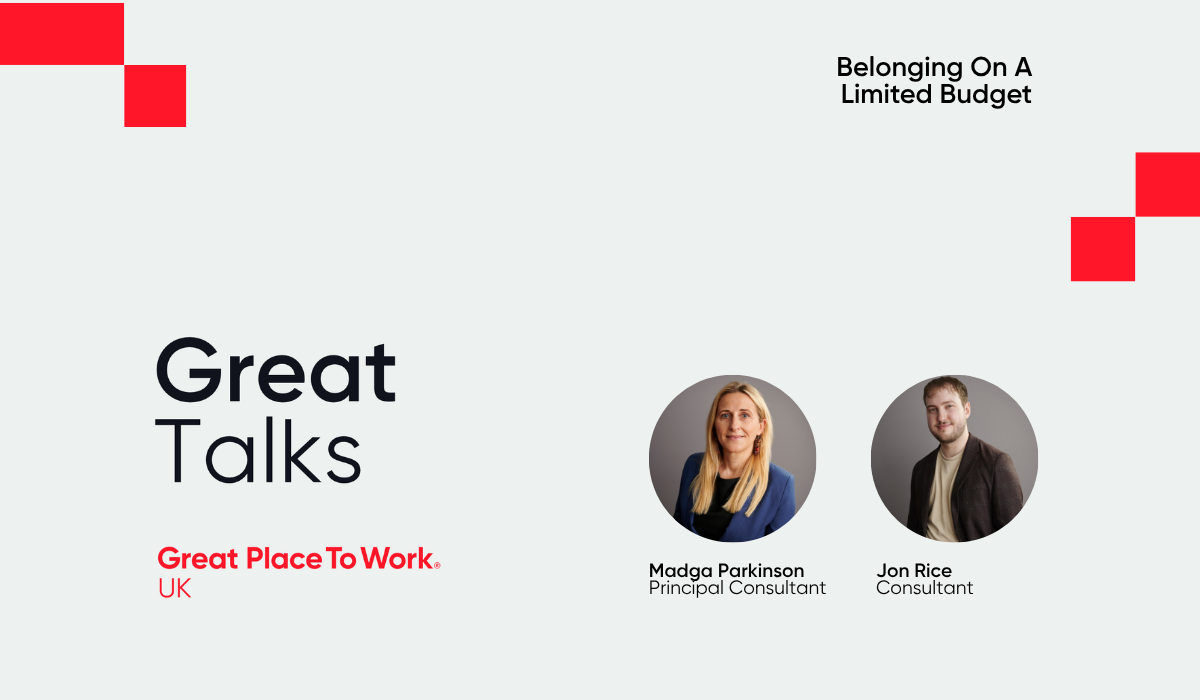In this installment of our special podcast series with HR Magazine, we hear from Experian – one of the top 25 World's Best Workplaces™ – on how they've developed a culture of innovation for all, by all, to propel their business forward.
Key Takeaways
Jacky Simmonds, Chief People Officer at Experian shares:
What has made Experian so open to innovation:
Jacky: We've always been pioneering in innovation. It's something that's at the heart of our business and has enabled us to stay ahead of the game and continue growing. I think what Covid did is make us really think about how to adapt to those changing ways of working. How do we respond to the evolving needs of our customers? It accelerated digitisation across many industries, including retail. At Experian, this meant looking at how we strengthen our identity and fraud solutions. Covid gave us a great opportunity to be even more innovative than we were before.
In practical terms, it accelerated how we boosted innovation to the next level. I think about the people perspective: Firstly, we were really focused on how we could maintain cultural alignment, in a completely remote world, and how to boost innovation during that period of time. Some of the things that we did were virtual hackathons, where we really think about some of our product strategies and how we bring people together during that time.
Experian really fostered innovation. I feel so proud to have joined at a time when the company was already going through a transformation from a data company to a global technology leader. We had an opportunity, I think, to really maximise pockets of excellence and use innovation to scale our business. And how that works in practice is making sure we can attract, develop and retain our top talent, particularly technology talent.
We've always had a very clear ambition to elevate Experian as a top tech employer and to be one of the best workplaces globally. It was in 2021 that we first started doing Great Place To Work surveys. But if we think about innovation: What is innovation? It's about how people work together and how we as a business get the best brains focused on our products and services, and how they can be developed, and that's taken on in many shapes and sizes, particularly in a global organisation.
Firstly, you need the right people – but you really also need the right culture. So you're fostering a really good culture where people feel that they belong, but also that they feel they're able to contribute. And so we really focused on quite a lot of those sorts of things to make sure that we could continue to innovate and really engage people with what our strategy is, and was, and how this has been developing over the last few years.
How Experian's ongoing partnership with Great Place To Work has helped the company to innovate and the business to thrive:
Jacky: We changed our strategy because it became obvious that some parts of our group were doing the survey with Great Place To Work and others were using different providers. Or when we did have one provider, people were supplementing it with Great Place To Work data.
As to how we could attract more technology talent to our organisation and how people view Experian (because they were seeing us really as a credit bureau), the rationale to change the survey strategy was also linked to how we get accreditation. And we could see that people named on the Best Workplaces™ List were very high-performing organisations, and they had a great reputation for engagement and strong cultures.
How that encourages innovation is we use the results of the survey. One of the questions we ask employees will be around, 'Are there any barriers to getting your job done?' or 'Is it easy to get things done?'. Those two are quite important because if you've got barriers to get your work done, that might be taking up more of your time rather than innovating and driving business forward. We use the data and insights to really foster that innovation culture and keep boosting it to the next level.
And of course, every year with high-performing companies the benchmark gets higher. You always have to raise your game. You can't be complacent that you get it once and that it continues. You have to carry on making the same efforts into that.
We do a combination of both the annual survey and quarterly pulse checks. Sometimes, if we feel the need to do it a little bit more, we will. But on the whole, it's at least three times a year. My advice would be to do one annual survey because it's a real point in time and it's quite good to have a line in the sand in terms of knowing that you can do one survey in depth; then the regular pulse checks are on areas that you know that you might need to improve. You can stay in tune with people much more frequently; identify any trends early; respond very quickly.

How hackathons work at Experian:
Jacky: Our people participate in global hackathons, through which we're able to really foster innovation. We also use agile methodology in many areas of our business, and that helps implement projects and programs. The hackathons are not just related to technology staff, but we do focus them a lot around areas where we might want to give some thought to some new products or ways of working. We can run them at several times of the year, and the focus can be different depending on what the priority is.
In recent years, for example, we've done quite a lot on gen AI, which is really important to integrate into some of our products, and it's a very core part of our business. But what we do ensure is that we have both tech and non-tech people involved. Last year, we had over 50 ideas that came out of those hackathons, and 50 ideas that were then deployed across Experian. One of those was a gen AI tool to simplify onboarding for new projects. Another one was around intelligent fraud monitoring to better support our consumers. There's a whole range of examples of things that come through via hackathons.
The 'Empower' team:
Jacky: We have a team called 'Empower', which is a team of around 4,000 colleagues who have been trained and certified in Lean Six Sigma. Though they've been trained in the methodology, they don't sit in a central team, meaning we allow anyone who joins the Empower course to get that certification, and people are really proud to get that.
One of the reasons behind creating this team has been improving our whole procurement process, and cost savings just by doing that. Our colleagues in North America, Canada, and the UK&I have something called My HR – an innovative, AI-driven platform that can make our colleagues' experience with their HR easier and simpler. And so we had some really good examples where people were able to use that platform, and the Empower team really helped us make sure our processes work effectively.
It's about operational efficiency, but sometimes it's also about innovations. We set up a Gen AI Academy, which was one of the ideas that came out of one of the processes that we run. That meant that every employee, no matter what job they do, where they work, can learn all about gen AI; get some training in that, and have access to tools. This has gone down very well because it's giving people a sense that Experian cares about their employees, and they care about upskilling you for the next thing, whether that be within the business or without.
One of the other things that we started to develop during Covid was a digital academy for all employees to access learning. We did have things that existed before, but with more people working hybrid and remotely, we set up a fully digital academy – one for leaders, and one for all employees.
We've been tracking our Great Place To Work results on development and learning. It came out the first time we ran the survey that this was an area that we needed to improve, and that now is just getting better and better as we develop those products. It's democratised learning. And we are now taking that further so that, using AI, it will be much more personalised to individuals. And if people are interested in another role, we'll be able to personalise the learning that they need in order to be considered for that role.

It is something that's really come about from feedback from our employees, and also really investing in technology to give people a great digital experience. I think it's really important not to lose the human touch. We use the survey to get so much insight around how people feel, what they think, what are the areas that they feel could make a difference to the business in terms of how we run it going forward. We then support that by in-person focus groups as appropriate, and depending on what the topic is. And then we formulate plans and action plans to take that further – it's the combination of data, people's insights and feedback, and technology. It's a powerful combination and we are seeing it drive great results for us as we develop our business.
Start small, and build from there:
Jacky: [Our learning and development programme] started small; we developed it methodically. When you start something like this, you could really boil an ocean in terms of all the things that you might want it to do. Our digital curriculum was a career hub that became this one-stop shop. We then supplemented it, running Global Careers Weeks (which was an initiative that came out of one of the hackathons) and that was then focusing on building skills for the future.
Our people now have that combination of HR support, but also online tools and online AI coaches to help them drive performance. That combination is so important, and we know (probably because we employ more than 50% of the organisation in a technology role) that learning and developing and improving their capabilities and skills is not only important to all of our people, it means that we can remain at the forefront of innovation in terms of what we develop as a business as well. So, it is a win-win for everybody.
Supporting colleagues to get involved in innovation:
Jacky: We always did surveys, but we didn't always do the same one everywhere. So, working with Great Place To Work, as an externally accredited institution, was quite important – and it's a brand that people knew about, so that really helped us to start measuring the baseline for employee engagement. That was quite important in going through 'Where are we now, and where are the areas that we need to improve?'.
When I joined Experian, one of the things that everyone talked to me about was the great culture, and there was a great sense of pride. When you actually do a survey, you get the raw results on that, so you get the areas where it's working really well and areas where maybe it's not. I think that's an important measure for employee engagement.
But so many things go into that. We know that our approach to flexible working is really valued by our employees, and so that's something that we have focused on. There's a whole number of things that I think go towards employee engagement, particularly leadership, having strong leaders who embrace our people-first culture is also a really important part of it. And it's also just having a clear purpose; being clear about the purpose, and how people's roles make a difference; how you communicate that and constantly engage people with the strategy and what your business is trying to achieve.
And career progression: that people feel that they can shape our culture, and that they know that their feedback has been taken seriously, and we're actually doing something about it. I think that also adds to employee engagement, and I think the Great Place To Work survey is a point in time measurement of that for us.
How Experian defines and measures its great culture:
Jacky: We measure it in a number of ways. The survey is one of those measures, but I suppose all the other metrics that you get, such as employee turnover and other classic metrics. The other big measure – which is something that's really helped us since we partnered with Great Place To Work – is that it's helped build our reputation as an employer.
When I joined Experian, one of the things that I felt was that it was a really great company, but not everybody knew about Experian, or what we did and the culture. I did a whole series of one-on-ones with leaders and a series of focus groups; and the one thing when I asked the question, 'What makes you stay?' they all said, 'The great culture.' Our culture is a great differentiator for us. It's an important thing and it is a real underpin of everything.
Behaviour of leaders is very important – how we position ourselves, how we treat people. That people-first culture is crucial, even when you have to make difficult decisions around reorganisation, really emphasising that you are treating people well, you're communicating, you're doing all the right things.
Where that's manifested itself now is that we're seeing high levels of referrals. And so, when people refer their friends and family, that's always an important sign for us because I don't think you refer your friends and family to somewhere that you work if you don't really believe it's 'a great place to work'. I feel very proud of that, and I'm proud of everyone that has contributed to that. Right from the most senior leaders, everybody takes it seriously and wants to make sure that we manage the culture, we focus on it, and we don't do things that derail it.
The impact of Great Place To Work recognition at Experian:
Jacky: There's been quite a number of areas where we've seen a great impact. For us, one has been on reputation and retention from both an employer and employee standpoints.
When we started doing this work in 2021, we used to get maybe half a million job applications a year. Since we've been doing Great Place To Work, that's increased significantly. And then when we got included in the top 25 World's Best Workplaces™, we've now get 250,000 applications a month! The ability to attract people has been significant.
We were Certified™ in 26 countries, and so that's made our brand much stronger. In somewhere like Latin America, we may not have been particularly visible previously. But since we've got this accreditation, we've got a lot of people apply to us. That has really made a big difference in terms of great interest.
The other thing that it's done is made people who work with us feel proud, and just a sense of pride in the culture. Because I think they all know that they've been contributing to it and made it important. And because we've been acting on the feedback and we are making improvements, people trust it now in the sense that they know if something comes out of it where we can take action, we'll be very clear about that.
It's made a great difference to our reputation as an employer and it's allowed us to retain and attract people. When we ask people why they've joined us, they mention that they saw we were one of the Best Workplaces. It's been a great mechanism for us to really attract the talent that we need to develop our business.
Related | Cherry O'Sullivan: "Insights From The Survey Are Truly Embedded Across The Organisation"

How HR leaders can go about securing engagement and pivoting their approach when dealing with different kinds of stakeholders:
Jacky: Great Place To Work creates a Trust Index score and that is the overall measure of whether you're 'a great place to work'. It's the aggregate of all of the questions that you get asked in the survey, including quite a number of questions about leaders. We pull out an extract of that data around leadership effectiveness, so that every leader will get a Leader Effectiveness Score. They're all focused on their engagement scores, and they always want to make sure that they've taken the areas for improvement very seriously and develop action plans. We engage general employees, champions that get involved – but the leaders, they take it very seriously.
We talk about it in our operating committee, and at the Board. But every leader knows that they can see their results. If they've got more than five people who report to them, they have a very clear view of their own leadership. And then we supplement that with normal development programmes. When someone joins us, for example, as a new leader coming in from a different company, we spend time discussing how they're transitioning into our business, supporting them as much as possible. We are very clear about the sorts of behaviours that we expect, and those are all around values, trust, integrity, as well as driving business performance and innovation.
All good HR people will know that leaders come in all shapes and sizes, and what makes one effective could be different for another. I think all we can do is to make sure that we have the tools and the support available to help them with their own development.
Particularly in recent years, where we're asking leaders to work with a much more distributed workforce, one in four of our leaders has people in different countries to where they're based. It becomes much more complex to lead, and so it's our responsibility to continue to support them and also ensure that they are focused on engagement as well.
How to encourage innovation when a role doesn't obviously lend itself to that:
Jacky: We try to encourage continuous improvement. Everyone can innovate. It's not the domain of any one function or department – we try to make sure that people's ideas can get heard. This culture of continuous improvement has evolved into a global strategic enabler of innovation. Over 4,000 employees have been trained in Lean Six Sigma in the last 10 years, with something like 5,000 improvements been made in various things as a result. That's about $140 million of savings that were delivered year after year, which innovation into a shared responsibility. Everyone can challenge the status quo if they want to.
I think trust is key. That's why it's interesting with Great Place To Work who call the overall summary of everything the Trust Index – it's so important. If you lose trust, it's very hard to get it back.
What Jacky is most excited about right now:
Jacky: I'm very excited about gen AI and how that can help HR functions, particularly to make things easier to get done. Trying to navigate through many policies and different ways of working, particularly if you work across different countries, can sometimes be quite difficult for line managers to do. And it often can take HR business partners' time away from maybe focusing on some of the more important strategic things. I feel really excited about the opportunities that Gen AI can provide to our employees to improve the way they get things done and enhance the overall employee experience. Of course, AI is meant to help us be more efficient in our work, not replace human interaction - we should use it to deliver better value for our people, but the future will always be people-centric.
🎧Up next: Lessons from Admiral's 25 Years as a UK's Best Workplace – hear from one of the UK's most iconic Best Workplaces on how they've remained consistent in their outstanding culture.
